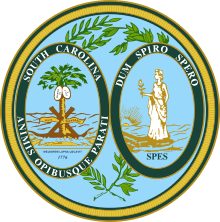United States Senate election in South Carolina, 1918
The 1918 South Carolina United States Senate election was held on November 5, 1918 simultaneously with the special senate election to select the U.S. Senator for a six-year term from the state of South Carolina. Nathaniel B. Dial won the Democratic primary and was unopposed in the general election to win the six-year term to the Senate.
Democratic primary
The primary election in 1918 for Senate was shaping up to be a contentious affair between Ben Tillman and Cole Blease, two of the state's most notorious demagogues. Blease had performed surprisingly well in the 1916 gubernatorial election where he had almost knocked off incumbent Governor Richard Irvine Manning III. The death of Tillman in July ended all prospects of an epic battle and the race became a contest between Blease and Nathaniel B. Dial. The South Carolina Democratic Party held the primary on August 27 and Dial garnered over 50% of the vote to avoid a runoff election. Blease suffered the worst loss of his political career mainly because of his vitriolic opposition to World War I which made him appear as a traitor. There was no opposition to the Democratic candidate in the general election so Dial was elected to a six-year term in the Senate.
| Democratic Primary | ||
|---|---|---|
| Candidate | Votes | % |
| Nathaniel B. Dial | 65,064 | 58.7 |
| Coleman Livingston Blease | 40,456 | 36.5 |
| James F. Rice | 5,317 | 4.8 |
General election results
| Party | Candidate | Votes | % | ± | |
|---|---|---|---|---|---|
| Democratic | Nathaniel B. Dial | 25,792 | 100.0 | 0.0 | |
| Majority | 25,792 | 100.0 | 0.0 | ||
| Turnout | 25,792 | ||||
| Democratic hold | |||||
See also
- List of United States Senators from South Carolina
- United States Senate elections, 1918
- United States House of Representatives elections in South Carolina, 1918
- South Carolina gubernatorial election, 1918
References
- Jordan, Frank E. The Primary State: A History of the Democratic Party in South Carolina, 1876-1962. pp. 64–67.
- "Report of the Secretary of State to the General Assembly of South Carolina. Part II." Reports of State Officers Boards and Committees to the General Assembly of the State of South Carolina. Volume II. Columbia, SC: 1919, p. 43.
